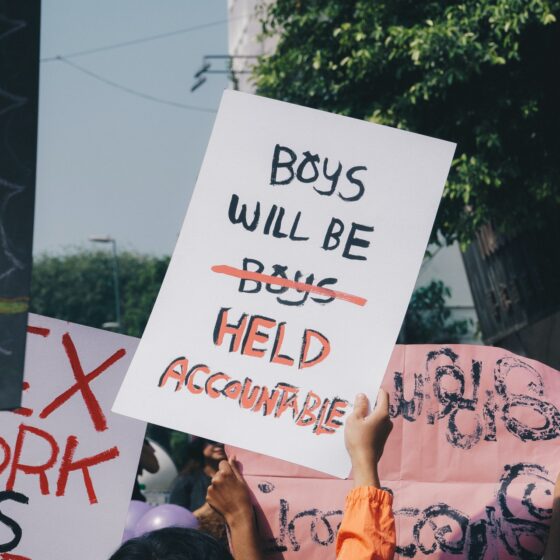U.S. Education Secretary Betsy DeVos, billionaire anti-public education ideologue, has just released new regulations for U.S. universities dealing with sexual misconduct. Think she would want to protect victims of sexual assault? Think again. Her new regulations bolster the protections of those accused of sexual assault, not their victims, effectively giving assaulters legal “due process” rights in university administrative proceedings. This means that victims of assault are less likely to bring claims to their universities, and if they do, they risk getting drawn into protracted, painful, and often expensive legal proceedings, rather than being protected by university administrative proceedings.
Title IX is the 48 year-old U.S. law that forbids sex discrimination in university programs that receive federal funding. As a result of this law, universities are legally required to establish disciplinary proceedings to protect victims of sexual discrimination, including sexual harassment or assault. Up until now, universities have had fairly wide latitude in how they administer their policies.
DeVos’ new regulations narrow the definition of sexual harassment, limiting those who may bring a complaint. They also limit the complaints that schools are obligated to investigate. Now, disciplinary action can only be taken if complaints are filed through a formal process and to specific university officials. Universities will also only be responsible for looking into incidents occurring within their programs and official activities. Universities will also have increased flexibility in how they determine whether or not sexual misconduct has occurred, based on either a “preponderance of evidence” or “clear and convincing evidence” standard.
Perhaps most importantly, the new regulations now require universities to hold live hearings in which the victims and the alleged perpetrators can be “cross-examined” to ascertain their credibility. Up until now, universities have typically implemented their own investigative and disciplinary processes, which typically involve interviews of victims, the accused, and other witnesses, followed by an adjudicative hearing. Universities, however, were previously not required by federal law to allow the “cross-examination” of victims in a live hearing. DeVos’ new regulations will now change that. So it turns out that there are certain kinds of new regulations that the Trump administration actually likes – those that protect perpetrators of sexual assault, and those that deter victims from coming forward.
As Terry Hartle of the American Council on Education, says, “Colleges and universities are not courts, and these sort of proceedings would require us to legalize student disciplinary proceedings. We lack the knowledge, the expertise, and credibility to do this.”
For a school to be held legally culpable for mishandling allegations, someone would have to prove that the university was “deliberately indifferent” in providing support to victims and carrying out complaints fairly. Of this, Betsy DeVos states, “Too many students have lost access to their education because their school inadequately responded when a student filed a complaint of sexual harassment or assault.”
On the surface, you’d think this means DeVos is a supporter of victims’ rights. If you’re not familiar with DeVos’ mission to disempower survivors (see her previous move to roll back Obama-era protections for survivors), you might be fooled into thinking she had some interest in giving survivors the minimum protections they deserve. Well, unfortunately, she doesn’t.
As someone who has been through the assault complaint process at a U.S. university, I can personally attest to how universities are not doing nearly enough to protect survivors. Even before DeVos’ new regulations, there were already too many opportunities for universities to just not deal with such complaints. Too many opportunities for perpetrators to retaliate against survivors, both in the university claims process and in subsequent legal proceedings against their accusers. And too many opportunities for the victims – not the perpetrators – to be re-traumatized by their university proceedings, and, all too often, to be forced to leave their universities to try and start over again, elsewhere.
After I brought a complaint against a student, and after he was found by the university to have violated the university’s sexual misconduct policy, he sued the university in state court because he hadn’t had the opportunity to question me in the hearing (he also sued me, but that’s a different story). The state court ruled that the university had to redo the hearing. So I showed up to the hearing. Strangely, he did not. Still, I was forced to relive the worst moment of my life in excruciating detail, but I answered all the questions that were asked of me. And the adjudicator found in my favor a second time.
At the time, I couldn’t understand why he and his (expensive) legal team would go through all that trouble, and then not even appear at the second hearing. This was their chance to ask me all the burning questions that they were allegedly deprived of asking me the first time around. But I eventually realized that the objective was never really to have a fair process – nor is that the objective of DeVos’ new policy. This is about using the courts and an increasingly legalistic process to intimidate victims against bringing claims to their universities. And this is about protecting perpetrators of sexual harassment and assault from being held accountable for their actions – even in a university disciplinary proceeding.
Universities are not the courts. This line was already blurred when I went through the university complaint process, with serious detrimental effects. Now, with the line being blurred even further, survivors of sexual assault will be faced with an even more impossible situation. As a result, even fewer victims will choose to bring a complaint. And the epidemic of campus sexual assault will continue.
As Fatima Gross Graves, President of the National Women’s Law Center, said, “Betsy DeVos and the Trump administration are dead set on making schools more dangerous for everyone – even during a global pandemic. And if this rule goes into effect, survivors will be denied their civil rights and will get the message loud and clear that there is no point in reporting assault.”
Yes, DeVos amended her first proposal, which would have allowed universities to ignore misconduct that happened off-campus. But is it that much better? Not really.
And predictably, Trump personally commended DeVos for rolling back the scant existing protections of victims of sexual assault – and rolling out new regulations protecting the accused.
These new policies have not yet gone into effect, and under the Congressional Review Act, they could still be overturned by Congress. But given the track record of this Congress in protecting women’s rights, or anyone’s rights, I wouldn’t count on it. Stay tuned.









